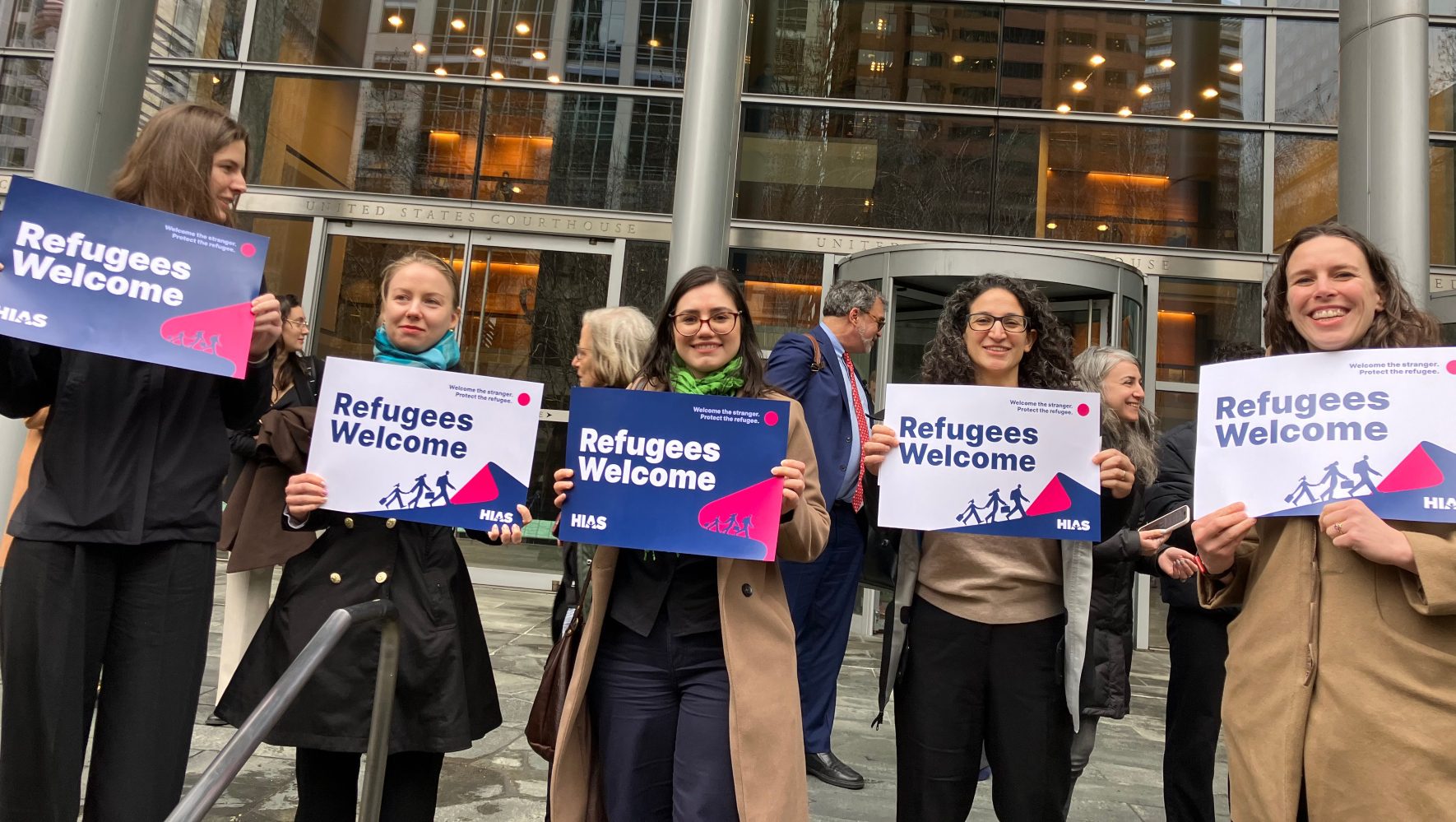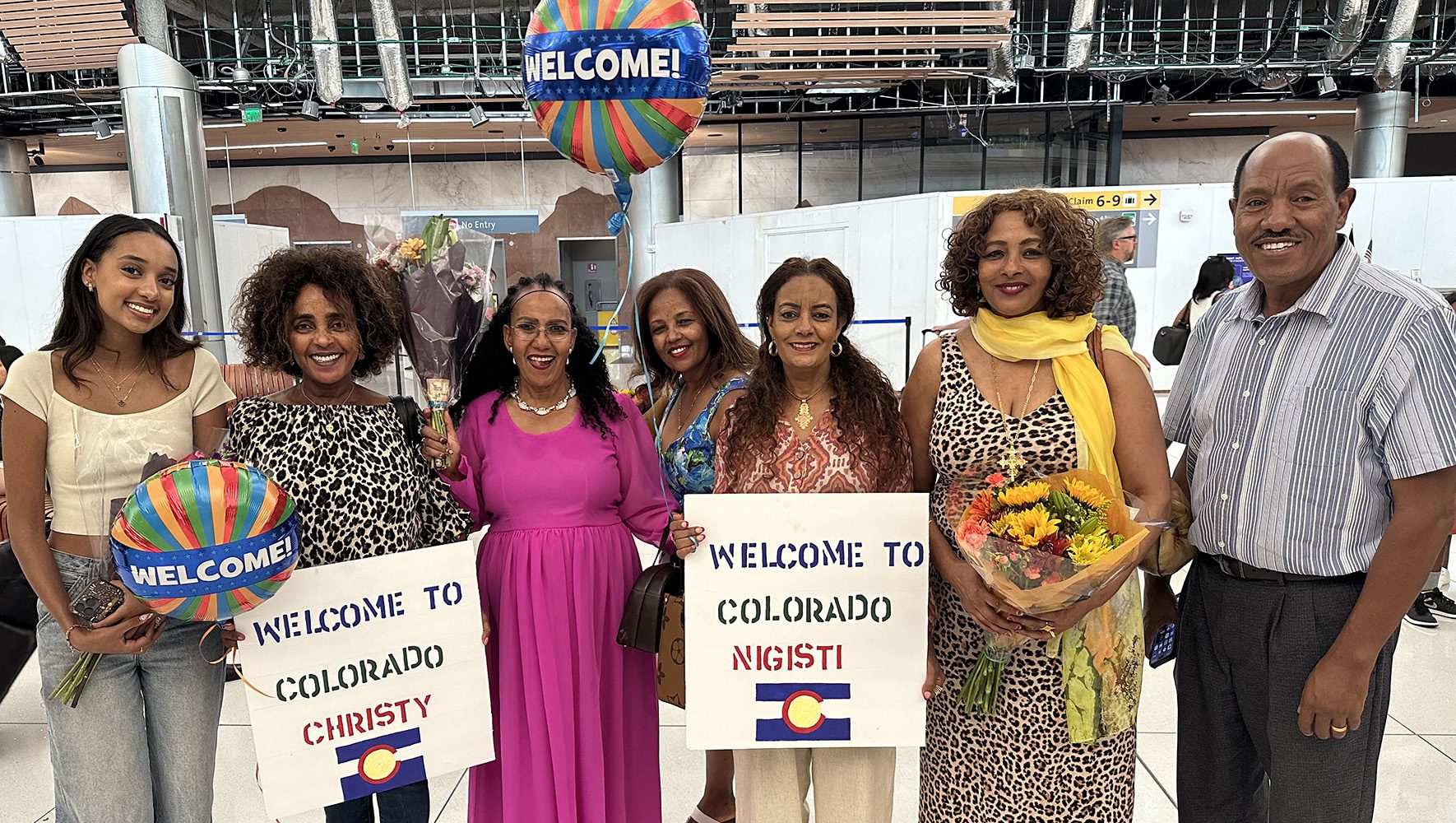HIAS Volunteers in Their Own Words: Part Two
Apr 18, 2018
In honor of National Volunteer Week (April 15 - April 21), HIAS is celebrating the invaluable contributions of our volunteer network. Welcoming refugees and asylum seekers to the United States would not be possible without the tireless efforts of the thousands of volunteers and volunteer coordinators across the country.
Below are brief accounts by three volunteer coordinators who serve refugees and asylum seekers in Ohio, Michigan and Washington, DC, describing their involvement in their own words. To read more entries in this series, click here.
Oriana Brenzo
Microenterprise Development (MED) Program Coordinator at US Together, one of HIAS’ local resettlement partners in Cleveland, Ohio.
 US Together (UST) is a mutual assistance association which means it was founded by refugees and is run by refugees.
US Together (UST) is a mutual assistance association which means it was founded by refugees and is run by refugees.
Initially providing services to Russian speaking populations, UST began resettling diverse refugee populations in 2005. In 2007, UST opened an office in Cleveland.
Volunteers at US Together have the opportunity to participate in mentoring an individual or family, sharing a meal, welcoming a new family, ESL tutoring, job coaching and employment services, house set- up, health care access, art therapy, fitness education, financial literacy, life skills, small business training for women, green card clinics, office management and our regular special events.
UST collaborates with many community partners, universities, and local high schools to create new programs, volunteer opportunities, while educating and building awareness to the Cleveland community. Such partnerships include, John Carroll University Service for Social and Social Action, Case Western Reserve University Green Card Clinic, Salaam Cleveland Care Medical Program, Design for America, and Lakewood High School Facing History and Ourselves.
Currently, US Together has around 45 volunteers.
In January, we started doing Microenterprise and Development (MED) with our first cohort of 10 women. MED is a program where refugee women have access to Small Business and Credit Building Loans after completion of a 12-week business course.
The goal of the program is for every woman to get the business and emotional support she needs when starting her new business. For many, they owned their own business in their home country, but they need the tools and education to do so in the United States. At US Together, we educate women in business skills in the United States. Mentors and volunteers also can engage in cultural exchange and emotional support.
In addition to classes, women are matched with volunteer mentors, receive coaching from UST staff, open a bank account, develop a peer network, attend field trips, and engage with guest speakers.
The MED volunteer program is very unique because although it’s a business program, it is also a women’s empowerment program. MED empowers women through education, business skills, and ultimately, self-sufficiency. We offer many opportunities that go hand in hand with business and empowerment.
A moment that surprised me was when one of our volunteers realized the clients she was working with were from Nepal. She asked me if it was okay is she introduced herself in Nepalese. I was overwhelmed with joy, I want all volunteers and clients to feel comfortable.
Our volunteer shared with us that she is a refugee from one of the same camps as one of our clients.
Another nice surprise was when many participants were getting sick from our cold Cleveland weather, our intern Katie from John Carroll University made care packages for sick students. All clients got tea, cough drops, tissues, juice, hand sanitizers, and get-well cards packaged together in pink bags.
Our ladies have had the opportunity to share their culture with us as well, through the celebration of Holi, the Nepali "festival of colors." That day was emotional for me, because everyone was extremely happy throwing colors at each other, eating, and dancing (see photo above).
I hope we can continue to grow our volunteers in the classroom setting. I find it highly beneficial when our students can work with community partners and gain access to additionally resources.
Nicole Feinberg
IDA and MED Programs Coordinator at Jewish Family Services of Washtenaw County, one of HIAS’ local resettlement partners in Ann Arbor, Michigan.
 Jewish Family Services of Washtenaw County is a private non-profit social services agency serving the greater Ann Arbor community since 1993. As an agency that serves a diverse, international population, the mission of Jewish Family Services is to create solutions, promote dignity, and inspire humanity. We currently work with over 200 volunteers, and receive assistance from them in all of our programs offered at JFS.
Jewish Family Services of Washtenaw County is a private non-profit social services agency serving the greater Ann Arbor community since 1993. As an agency that serves a diverse, international population, the mission of Jewish Family Services is to create solutions, promote dignity, and inspire humanity. We currently work with over 200 volunteers, and receive assistance from them in all of our programs offered at JFS.
Volunteers play a critical role in providing essential services to our clients, while providing a personal connection that allows our clients to truly feel part of a greater community.
Microenterprise Development (MED) at JFS utilizes volunteers to assist women refugee clients in launching or growing their own small businesses. The MED program, which officially launched in February, engages participants in a 12-week curriculum with trainings on financial literacy, life skills, digital literacy, vocational ESL, small business training, and pre-loan technical assistance.
Additionally, participants engage with local professional mentors and develop interpersonal, professional, and entrepreneurial skills throughout the program, preparing them to launch their own small business. The outcomes of the program provide participants with small business and credit building loans, in hopes to build their financial independence and grow their businesses successfully. An additional, and primary goal of the program, is to build a supportive social network among all participants, allowing them to encourage each other to grow individually and professionally, while building their own community.
Seeing one program participant significantly improve her English abilities, as well as grow her self-confidence has been incredibly rewarding. Upon initially starting the program, this participant was extremely quiet, reserved, and unsure of her abilities to speak-up and become an entrepreneur. With the support of her peers, and one specific volunteer, she has built a great deal of confidence and has improved her English significantly. This specific volunteer has remained in touch with client outside of class hours, investing additional ESL assistance and general support.
We also have a volunteer named Oana Popa, who has gone above and beyond the original requirements of the program. Oana has been extremely flexible and eager to assist in any way requested, while also seeking out new responsibilities to take on. She has provided a warm, comfortable, and encouraging space for all program participants to go outside of their comfort zones and grow immensely. Oana has reported to me that the MED program is teaching her a lot too, and that along with teaching her students, she is getting a lot of valuable experience.
This program is so unique, as it is geared specifically towards women empowerment, and has such potential for positively impacting the surrounding entrepreneurial community. The MED program allows volunteers to not only assist our program participants, but also provides them the opportunity to personally impact the lives of many refugee families.
Josh Kurtz
Community Organizer and Avodah Corps Member at HIAS in Washington, DC. He is working to mobilize the Jewish community to speak out for refugees and, in partnership with HIAS’ legal team, to provide holistic, wrap-around services for HIAS’ asylum seeking clients in the area.
 In the Greater Washington, DC area, HIAS’ community engagement team is working to build a robust constituency of Jews taking action on behalf of refugees and asylum seekers. We engage local Jews through educational, direct-service, and advocacy opportunities.
In the Greater Washington, DC area, HIAS’ community engagement team is working to build a robust constituency of Jews taking action on behalf of refugees and asylum seekers. We engage local Jews through educational, direct-service, and advocacy opportunities.
Although HIAS provides comprehensive legal assistance to asylum seekers in the DC area, our staff does not have the capacity and infrastructure to provide wraparound services to our clients, who have fled violence and persecution in their homes counties. Moreover, asylum seekers are ineligible for most public benefits, making it difficult for them to access the resources that they need to build new lives in the United States.
Since I joined HIAS in September 2017, I’ve worked closely with Kerry Honan, who is an immigration advocate with our legal team, to develop a direct-service volunteer program that expands the resources available to our clients. Over the past several months, we’ve recruited and trained dozens of volunteers to serve as mentors for our clients. We offer a number of direct-service volunteer opportunities, including English-language tutoring, career mentorship, education mentorship, and on-call transportation and childcare support.
Additionally, HIAS partners with Freedom For Immigrants, an organization working to end immigration detention, for a monthly program where volunteers write letters of compassion and solidarity to asylum-seekers in immigration detention. Each month, volunteers handwrite letters and participating in educational activities that reflect on refugee and asylum issues through a Jewish lens.
Over the past year, the Trump Administration has proposed and implemented policies that threaten the United States’ long history of welcoming refugees. As a community organizer, I’ve had the opportunity to mobilize hundreds of local Jews to stand in solidarity with refugees and asylum seekers. On the one-year anniversary of President Trump’s refugee and Muslim ban, dozens of American Jews joined faith leaders, members of the Muslim-American community, refugees and advocates in front of the White House to publicly oppose the administration's ongoing attacks on the United States’ refugee program.
We have also been working over the past several months to build HIAS Action DC, a network of individuals in their 20s and 30s who are committed to speaking out for asylum seekers and refugees in the United States and abroad. This past fall, members of the network gathered outside the U.S. Capitol to call on our nation’s leaders to make this a sweet year for the more than 65 million people in the world fleeing from violence and persecution.
It has been a privilege to work with individuals who are speaking out for refugees in the streets, on Capitol Hill, and in their communities. HIAS’ programs in the United States and abroad would not be possible without the passion and commitment of volunteers. In the 1960’s, my family fled Romania and settled in the United States with the assistance of HIAS, and I’m honored to have the opportunity to assist those who are fleeing from violence and persecution today. Over the next several months, we will continue building a sustainable and comprehensive direct-service volunteer program and mobilizing communities in Washington DC and around the country to stand up for the rights of refugees.



